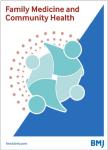Survival in men older than 75 years with low- and intermediate-grade prostate cancer managed with watchful waiting with active surveillance
作者机构:Department of Epidemiology and BiostatisticsCase Western Reserve University School of MedicineClevelandOHUSA Case Comprehensive Cancer CenterCase Western Reserve University School of MedicineClevelandOHUSA Levine Cancer InstituteCarolinas Healthcare SystemCharlotteNCUSA Department of Family Medicine-Research DivisionCase Western Reserve University School of MedicineClevelandOHUSA
出 版 物:《Family Medicine and Community Health》 (家庭医学与社区卫生(英文))
年 卷 期:2015年第3卷第3期
页 面:25-36页
学科分类:1004[医学-公共卫生与预防医学(可授医学、理学学位)] 1002[医学-临床医学] 1001[医学-基础医学(可授医学、理学学位)] 100214[医学-肿瘤学] 10[医学]
基 金:by grants from the National Cancer Institute(U54 CA-116867-01 to Li Li) the National Institute of Aging(P20 CA10373 to Li Li) Siran M.Koroukian was supported by a Career Development Grant from the National Cancer Institute(K07 CA096705)
主 题:Epidemiology watchful waiting prostate cancer
摘 要:Objective:Recent studies have reported the underuse of active surveillance or watchful wait-ing for low-risk prostate cancer in the United *** study examined prostate cancer-specific and all-cause death in elderly patients older than 75 years with low-risk tumors managed with active treatment versus watchful waiting with active surveillance(WWAS).Methods:We performed survival analysis in a cohort of 18,599 men with low-risk tumors(early and localized tumors)who were 75 years or older at the time of prostate cancer diagnosis in the linked Surveillance,Epidemiology,and End Results(SEER)-Medicare database(from 1992 to 1998)and who were followed up through December *** was defined as having an-nual screening for prostate-specific antigen and/or digital rectal examination during the follow-up *** risks of prostate cancer-specific and all-cause death were compared by Cox regression *** propensity score matching technique was used to address potential selection ***:In patients with well-differentiated(Gleason score 2-4)and localized disease,those managed with WWAS without delayed treatment had higher risk of all-cause death(hazard ratio 1.20,95%confidence interval 1.13-1.28)but a substantially lower risk of prostate cancer-specific death(hazard ratio 0.62,confidence interval 0.51-0.75)than patients undergoing active *** managed with WWAS with delayed treatment had comparable mortality ***-tivity analyses based on propensity score matching yielded similar ***:In men older than 75 years with well-differentiated and localized prostate cancer,WWAS without delayed treatment had a lower risk of prostate cancer-specific death and compa-rable all-cause death as compared with active *** patients in whom treatment was delayed had comparable mortality *** results support WWAS as an initial management option for older men with well-differentiated and localized prostate cancer.



